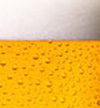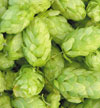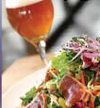|
||||||||||||
|
Philosophy is defined as: a set of ideas or beliefs relating to a particular field or activity. My philosophy toward beer drinking is ever evolving. Many years ago it was all about drinking beer. The beer of choice was a light American Lager and twelve packs disappeared rapidly. Around 1994 the microbrew revolution was on. I began to enjoy the taste of beer more and drinking smaller quanitites. New breweries and brewpubs were opening up every month. The brewpub idea was new to the southeastern part of the country and I wanted to check it out. The first brewpub I visited was Tumbleweed Brewing and Mexican Restaurant. It was in a converted house in Boone NC. They even had growlers to go! The brewhouse was a small building behind the restaurant that allowed tours but only during the day. I never got to see how they were brewing but their beers were good. I was there with friends and tried some unfamiliar ales that really were good. They also went well with the excellent food they made. The last beer I tried was a Raspberry favored beer and it actually tasted good! The idea of flavored beers was unheard of, at that time, and didn't sound good. That raspberry ale still is remembered as one of the better I have ever had. I am not really big on flavored beers to this day but every now and then a good one comes up. With that humble beginning I began to change my philosophy about beer and beer drinking in general. I still have too many from time to time but I also have learned to enjoy the taste and differences of all the new beers around. Since that first brewpub I have now visited over 200 breweries, brewpubs and beer stores. The beer world has changed immensely and the beers have too. Florida is finally moving up in the craft beer revolution but there is still work to be done. With this site and just in meeting people I have become a "messenger" of sorts for all things related to the new good beers. It really has been surprising how much good beers will come up in conversations. I have talked up good beer everywhere from the woods of North Carolina to the beaches of Florida. It is a common thread between many more people that you might think. In the past few years I have really progressed in the local craft beer arena. I am teaching Craft Beer at a local college's Culinary Institute and now offer my services for beer tastings, classes and other craft beer related events. (These services are listed on other pages of this website.) I have come to believe that good people really do drink good beer as Hunter S Thompson said when Flying Dog Brewery was formed years ago in Aspen CO. The people I have met at beer events and associated with the industry are good working people who enjoy a few good beers on their time off. Most beer events are great fun and there are always interesting people to meet. To really enjoy the current craft beer scene you have to be open minded. There are so many new beers and styles being introduced every month. At a recent tasting we had 13 beers to try from a hoppy pilsner, several IPAs, stouts and finally a barleywine. This would have been unheard of, in Florida, just two or three years ago. I am really enjoying the new stuff as I will never get tired of any one beer as I don't drink the same beer every time. The old way was to find a beer you liked and stick with it, and only it, until you got tired of it. Then change to another beer and do the same thing. A specific craft beer might be unavailable so I have learned to drink many different beers. Variety is the spice of life and life is 'spicy' in the craft beer selection these days. While writing and learning the material for my classes I learned many new facts and figures about beer. When I took this on I had no idea how intertwined beer was with history and the rise of civilization. Below I will try to explain just how and why man has advanced culture and civilization through beer! Beer, History and the Rise of Civilization The oldest proven references to brewing are 6000 years old. In ancient Egyptians brewed beer; soon it was the most popular beverage in Mesopotamia. As these old civilizations advanced so did brewing methods and ideas. Beer was an important part of early civilizations; the Babylonians had 20 different varieties of beer. Each culture used different grains for brewing; this was based on where they were and what grains had been discovered and used locally. As various empires came under new rulers the brewing processes slowly improved. Beer was cloudy and unfiltered; Egyptians added dates to the mixture to improve the taste. The pyramids were built on beer power; the workers were paid, in part, with beer. The occupants of the pyramids had many vessels of beer inside for the afterlife! People knew how to brew but really didn't know just what actually happened during the process. Roman Legions introduced beer into Northern Europe around 55 BC. As the cultivation of barley spread north and west brewing went with it. As time passed the production of beer went from family tradition to centralized production in monasteries and abbeys. The abbeys also refined the methods of brewing; initially for the brothers and visiting pilgrims, later as a means of financing the community. Society was moving toward congregational living (cities) and beer production provided one way of helping this happen. About 1000 AD hops were introduced into the brewing process; there still is very little known about the role of yeast in fermentation. Between 1200 and 1500 beer making was established commercially in Germany, Austria and England. The 'dark ages' were ending and beer played an important role in enlightenment and progress of societies. The Reinheitsgebot German beer purity law of 1516 was the first food safety law. This law allowed for only four ingredients in beer: water, barley, hops and yeast. The law said barley instead of wheat because wheat was expensive and used for food; beer would have to use barley. The law has changed over the years but established the Europeans' dislike of the use of adjuncts in brewing. In 1620 the pilgrims landed at Plymouth, in part, because they had run out of beer. Beer was important in the early history of our country too. Revolutionary solider's were rationed one quart of beer per day. Washington and Jefferson both had brew houses; Washington had a recipe for 'small beer'. James Madison proposed a low tax on beer to encourage "the manufacture of beer in every State in the Union”. In 1876 Louis Pasteur published the details of the cause of beer spoilage and a methodology for preventing spoilage. This was a major event in the development of the modern beer bottling industry as well as advancing the food and drink industries in general. Brewing survived prohibition; with far fewer breweries than before. The most popular beer style had become the light lagers that I started off with in the 1970's. By then the seeds of the modern craft beer renaissance were being laid. Anchor Brewing and Sierra Nevada were among of the first micro breweries to start up. The industry grew slowly; some of that due to out dated laws that favored the large national breweries. Into the 1990's things started to get better; that's when I discovered good beers. For Florida the big event was the repeal of the bottle size law to allow all sizes of bottles not just 12 oz. This really opened it up and new beers still are coming in to this day. The Florida brewing scene is really taking off. We are hearing about new breweries every month. This is good and the 'Drink Local" idea can now come into it's own here in Florida. As beer brewing and its associated industry continue to advance, hopefully, modern society will too.
One final philosophical note: I have noticed some saying "It's only beer" and other similar sentiments. While I do agree with the ideas behind it, beer has moved up in quality and status in my opinion. I don't want beer to become like wine with the snob appeal and pricey bottles of "rare" or special vintage. Wine tasters taste and spit it out whereas we beer tasters drink it as it was intended and can have really great beer tasting parties That's a lot more fun and it was made to drink not put on a shelf to admire for ten years. The food pairing idea has been used with wine for years and has translated to beer well. We are seeing many more beer and food related events than ever before. Beer dinners, food and beer pairings and regular menu items paired with beers. Many brewers now list beer pairings for each beer on their websites. I still want beer to remain the regular folks drink; there is room for differences and with all the varieties available, many new drinkers. I enjoy what I call good beer; others may not. That doesn't make anyone better that anyone else. I have been open to new ideas and tastes and really have enjoyed the beer revolution of the last fifteen years. Others may just want a their favorite beer without thinking about different styles etc. and that's ok with me. Beer aging is catching on; it is interesting to see how certain beers age over time. This only works for certain higher ABV beers; as a rule I want the freshest beer I can find. There are some pricey bottles of beer coming around but there aren't that many and there still are all the 'regular' craft beers to choose from. The choices increase everyday! |
||||||||||||
|
||||||||||||
| "love the life you live. live the life you love." — Bob Marley | ||||||||||||
| © larrygoeser.com |





